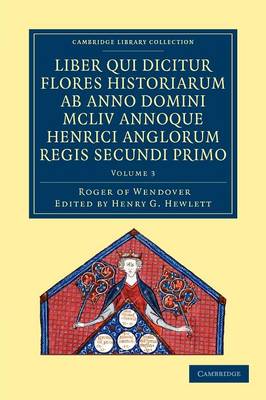Cambridge Library Collection - Rolls
1 primary work • 5 total works
Volume 2
A former prior of Belvoir, Roger of Wendover (d.1236) established himself as a chronicler at St Albans. This three-volume work, edited by Henry G. Hewlett (1832–97) and published between 1886 and 1889, comprises the latter part of the larger Flores opus and the part of the Latin text for which Wendover can claim direct responsibility. Volume 3 includes the introductory matter, glossary and index to all three volumes. Hewlett's introduction discusses the little we know of Roger of Wendover's life as well as his shortcomings and merits as an annalist - namely that he was unreasoningly credulous yet invariably candid. His true importance, however, is as a key influence on his historiographical successor, Matthew Paris, whose political outlook and interests he helped to shape. A comparison is drawn between this work and that of Paris, the more gifted chronicler, who 'complemented the deficiencies of Wendover's narrative by substantial additions'.
A former prior of Belvoir, Roger of Wendover (d.1236) established himself as a chronicler at St Albans. This three-volume work, edited by Henry G. Hewlett (1832-97) and published between 1886 and 1889, comprises the latter part of the larger Flores opus and the part of the Latin text for which Wendover can claim direct responsibility. The volumes cover the period from the start of Henry II's reign in 1154 to the year 1235. Hewlett is critical of Wendover's indiscriminate appetite for miracles and readiness to accept rumour as fact, but commends his candour, where it is not clouded by ecclesiastical bias. His true importance, however, is as a key influence on his historiographical successor, Matthew Paris, whose political outlook and interests he helped to shape.
A former prior of Belvoir, Roger of Wendover (d.1236) established himself as a chronicler at St Albans. This three-volume work, edited by Henry G. Hewlett (1832-97) and published between 1886 and 1889, comprises the latter part of the larger Flores opus. Volume 1 begins with Henry II's reign and covers the period 1154-1204. It marks the start of where Wendover can claim direct responsibility for the Latin text, his own observations now finding a place alongside predecessors' compilations from various earlier sources. Hewlett is critical of Wendover's indiscriminate appetite for miracles and readiness to accept rumour as fact, but commends his candour where it is not clouded by ecclesiastical bias. His true importance, however, is as a key influence on his historiographical successor, Matthew Paris, whose political outlook and interests he helped to shape.
A former prior of Belvoir, Roger of Wendover (d.1236) established himself as a chronicler at St Albans. This three-volume work, edited by Henry G. Hewlett (1832-97) and published between 1886 and 1889, comprises the latter part of the larger Flores opus and the part of the Latin text for which Wendover can claim direct responsibility. Volume 2 concerns the years 1204-30 and covers the greater part of King John's reign and Henry III's early years on the throne. While Wendover is often criticised for his shortcomings as a historian, his candour in treating the 'abominable misrule' of John's reign is noteworthy. His true importance, however, is as a key influence on his historiographical successor, Matthew Paris, whose political outlook and interests he helped to shape.
A former prior of Belvoir, Roger of Wendover (d.1236) established himself as a chronicler at St Albans. This three-volume work, edited by Henry G. Hewlett (1832-97) and published between 1886 and 1889, comprises the latter part of the larger Flores opus and the part of the Latin text for which Wendover can claim direct responsibility. Volume 3 includes the introductory matter, glossary and index to all three volumes. Hewlett's introduction discusses the little we know of Roger of Wendover's life as well as his shortcomings and merits as an annalist - namely that he was unreasoningly credulous yet invariably candid. His true importance, however, is as a key influence on his historiographical successor, Matthew Paris, whose political outlook and interests he helped to shape. A comparison is drawn between this work and that of Paris, the more gifted chronicler, who 'complemented the deficiencies of Wendover's narrative by substantial additions'.

